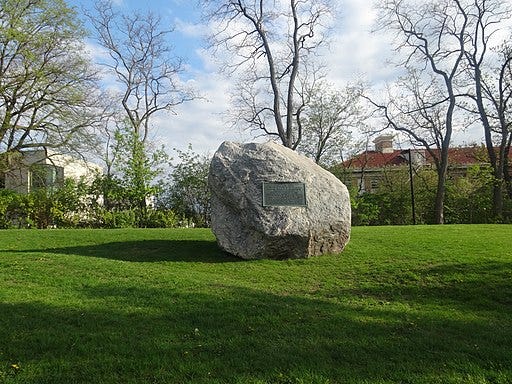E-Pluribus | August 25, 2021
Revisiting the racist rock, we should not have to choose between science and our rights, and the pernicious effects of cancel culture.
A round up of the latest and best writing and musings on the rise of illiberalism in the public discourse:
John McWhorter: The Performative Antiracism of Black Students at the U. of Wisconsin
On August 9, we included the breaking news of the racist rock at the University of Wisconsin in that day’s E-Pluribus (item #2.) In his new newsletter at The New York Times, John McWhorter digs deeper into the rock issue, suggesting that rather than confront “Kabuki as civil rights,” the administration took the easy, lazy way out: condemn the rock.
If the presence of that rock actually makes some people desperately uncomfortable, they need counseling. And as such, we can be quite sure that these students were acting. Few can miss that there is a performative aspect in the claim that college campuses, perhaps the most diligently antiracism spaces on the planet, are seething with bigotry. The Wisconsin rock episode was a textbook demonstration of the difference between sincere activism and playacting, out of a desire to join the civil rights struggle in a time when the problems are so much more abstract than they once were.
The true fault here lies with the school’s administration, whose deer tails popped up as they bolted into the forest, out of a fear of going against the commandments of what we today call antiracism, which apparently includes treating Black people as simpletons and thinking of it as reckoning.
True wokeness would have been to awaken to the tricky but urgent civic responsibility of, when necessary, calling out Black people on nonsense. Yes, even Black people can be wrong. As the Black professor Randall Kennedy of Harvard Law puts it in his upcoming “Say It Loud!”: “Blacks, too, have flaws, sometimes glaringly so. These weaknesses may be the consequence of racist mistreatment. But they are weaknesses nonetheless.” To pretend this is never the case where racism is concerned is not to reckon but to dehumanize.
Read it all here.
Joel Zinberg: Science Matters—and So Do Individual Rights
During the COVID-19 pandemic, walking the fine line between public health and individual freedom has at times felt more like walking a tightrope over a shark tank. At City Journal, Joel Zinberg relates a recent incident at George Mason University that illustrates how science and respect for rights do not necessarily have to fight to the death.
GMU’s reopening policy requires all students, faculty, and staff to verify their vaccination status unless they obtain a religious or medical exemption—or risk disciplinary measures including unpaid leave, loss of merit pay, and termination of employment. Todd Zywicki, a longtime professor at GMU’s Antonin Scalia Law School, objected. He had already contracted and fully recovered from Covid-19 and, as a result, acquired natural immunity, confirmed by multiple positive SARS-CoV-2 antibody tests. His physician advised him that vaccination was unnecessary.
GMU insisted. Zywicki sued, claiming that the university could not show a compelling interest that should override his autonomy and constitutional rights to refuse a vaccine made unnecessary by his naturally acquired immunity.
GMU blinked. It granted Zywicki a medical exemption allowing him to hold office hours and attend in-person events provided that he maintains six feet of distance and that he undergo free, weekly Covid tests.
[…]
While the CDC is recommending booster shots, no one has yet suggested mandating boosters for fully vaccinated people. Even without boosters, the likelihood of vaccinated persons being infected and passing it on to others is simply too low to provide a compelling interest that should override personal autonomy.
Similarly, no institution should mandate a vaccine—in effect, a booster—for people with demonstrated natural immunity who represent a low risk of re-infection. GMU showed that it could easily accommodate professor Zywicki’s wishes. Yet, the measures the school is subjecting him to may be overkill, since he does not represent any bigger threat to his students and colleagues than those with documented vaccination. And he poses little threat to a school population that, because of the policy, is fully vaccinated.
Read it all.
David French: The Cancel Culture Paradox
At The Dispatch, David French explores some of the underlying reasons for and the pernicious effects of cancel culture. Given the vitriol that issues from both the right and left, French posits that extremes in discourse may be “less partisan or ideological than they are temperamental or relational.”
In my experience, however, ideological surveys of cancel culture fears don’t quite capture the human reality of who actually self-censors. For example, the same CATO survey that showed strong liberals feel free to speak showed that the overwhelming majority of “strong conservatives” feel they can’t share their opinions. But does that square with reality?
The online world is positively awash in right-wing opinion, strongly expressed. Strident right-wing voices tend to dominate Facebook metrics, for example. In fact the very culture of right-wing expression itself is increasingly vitriolic. In many cases, anger is seen as an indispensable marker of a person who belongs in the new right tribe.
After living for several years in our cancel culture universe, I’m convinced that the real demarcations between those who feel free to speak (and speak loudly!) and those who do not are less partisan or ideological than they are temperamental or relational.
Who speaks? Those with thicker skins or those who possess a sufficient sense of rage or urgency that enables them to push through the pain of blowback.
Who doesn’t speak? Those with softer hearts or those who are unwilling to risk personal and/or professional relationships over politics or to fight the culture war.
Read the whole thing.
Around Twitter:
Lis Smith on the state of journalism:
A short back and forth on what has happened to toleration:
Steven Pinker comments on a social justice research series by Richard Bernstein at Real Clear Investigations:
And finally, a thought on how to deal with enemies:









